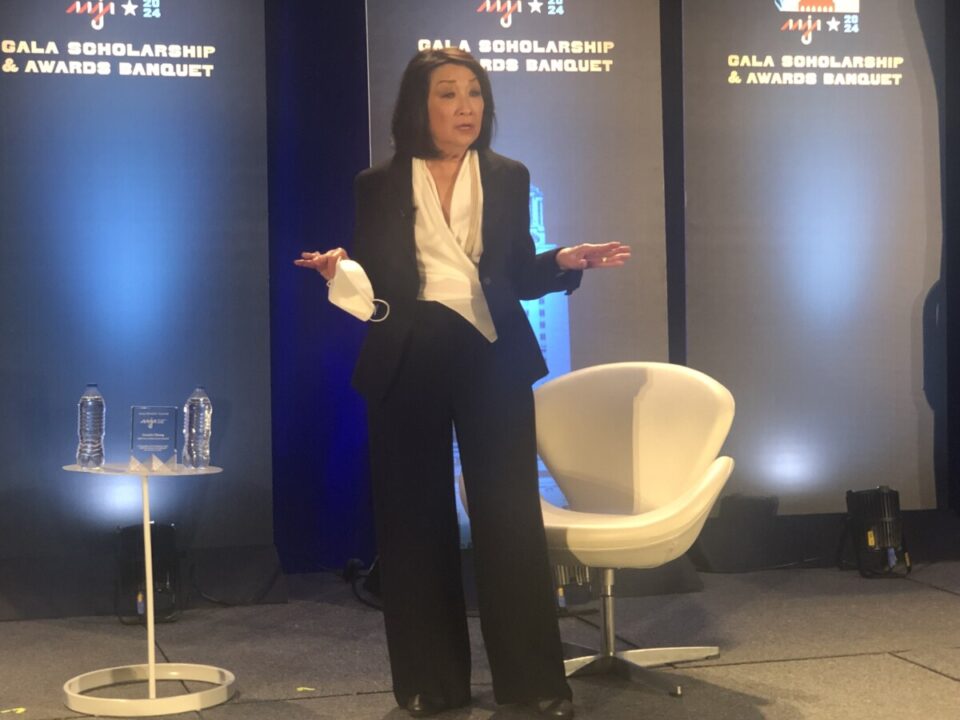Chung Says She Adopted the Bravado of White Men
Support Journal-isms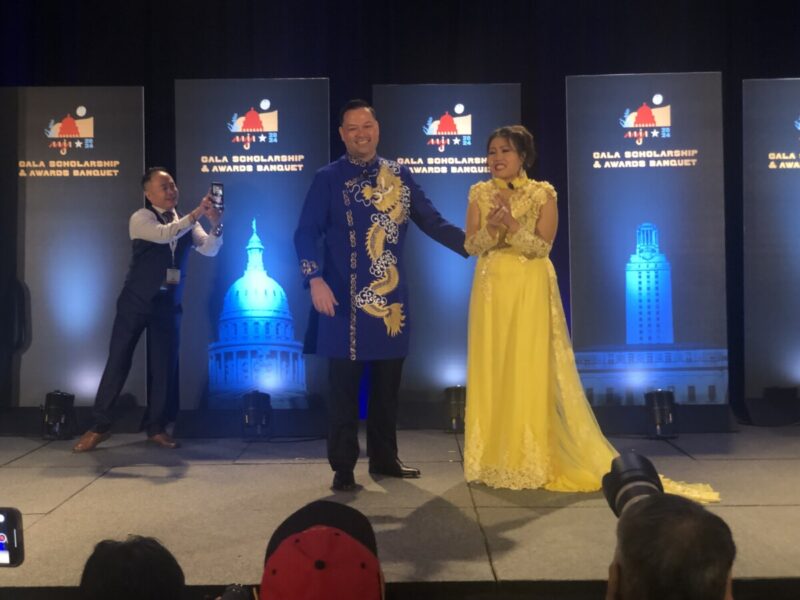
Co-host Jason Nguyen, senior investigative producer at KPRC-TV in Houston, is joyful after proposing to the equally happy Rosie Nguyen, race and culture reporter at Houston’s KTRK-TV, at the Asian American Journalists Association gala. (Credit: Richard Prince)
OMG!!! They’re engaged! Congrats to @RosieABC13! Jason Nguyen proposed on stage at #AAJA24!! pic.twitter.com/cff1ps2ZKm
— Miya Shay (@miyashay) August 11, 2024
Chung Says She Adopted the Bravado of White Men
Television news icon Connie Chung promised to name names in her forthcoming memoir, the president of the Asian American Journalists Association was re-elected, next year’s convention city was named, and Vietnamese American author Viet Thanh Nguyen made his case for telling Vietnamese families’ side of the Vietnam war.
But none of that topped the on-stage proposal Saturday night.
Jason Nguyen asked his fellow gala co-host Rosie Nguyen, like him a Houston television journalist, to marry him. Their close family members watched.
It was the closing gala at the Austin, Texas, AAJA convention.
The audience in the Austin Hilton’s grand ballroom, which attracted 666 of the convention’s 1,489 registrants, was beside itself.
“I said yes,” Rosie Nguyen told the cheering audience. Photographers in the room recorded the moment.
No members of the outside press were evident. A recently adopted AAJA policy barred outside journalists from attending the convention for more than a day unless they paid up to $675 to register for the entire conference. (Journal-isms found another way to witness the event.)
The press would have been treated to Chung, the first Asian American and the second woman to anchor one of America’s major network newscasts, describe how she imagined herself a white man in order to muster the bravado to compete with them.
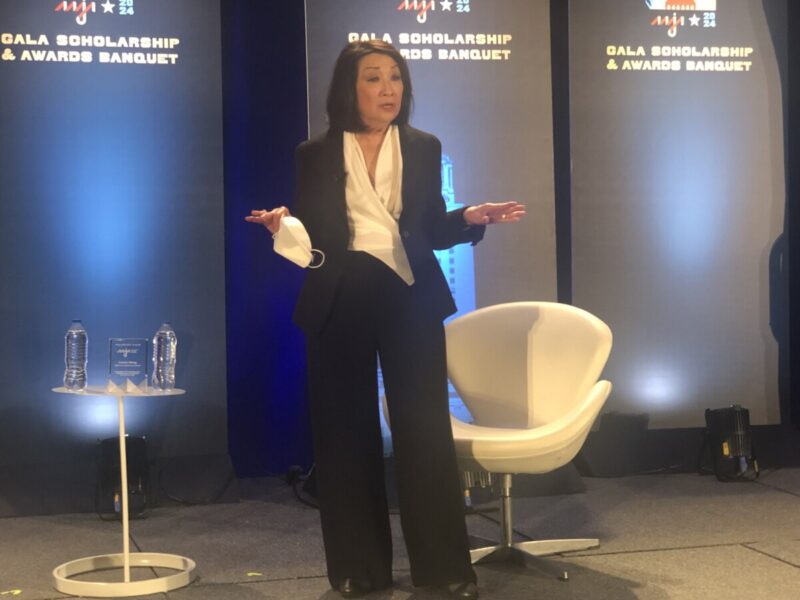
“I never wanted to be called a diva or a bitch or anything of the sort,” Connie Chung told AAJA. (Credit: Richard Prince.)
“I decided to become a guy,” she said. At first emotional, then exuding confidence and humor, Chung told her interviewer, ABC News’ “Nightline” co-anchor Juju Chang, “we are sassy bad asses. Nobody’s going to mess with us.”
Chang, later given the AAJA President’s Award, echoed Chung’s husband, television personality Maury Povich, who had told his wife, “You were the Jackie Robinson of television news.”
Chung turns 78 on Aug. 20. She promised that her soon-to-be-released “Connie: A Memoir,” would name some of the male colleagues who tormented her, including those who “loved the sound of their own voices” or “had delusions of sexual prowess.”
“Sexism and racism and sexual innuendo were so prevalent in the ’70s,” she said.
It was no secret then that “CBS Evening News” anchor Dan Rather’s resented having to share his position with Chung when she was named co-anchor in 1993. In May 1995, CBS informed Chung that it was removing her from the co-anchor chair, offering the lower position of weekend and substitute anchor. Chung declined, requesting instead to be let out of her contract, recalls Biography.com.
Still, Chung became an icon. So many Asian Americans named their daughters “Connie” that last year, The New York Times ran a piece about the various women with the name.
The Times invited Chung into a studio with 10 other Connies named after her.
Writer Connie Wang concluded, “America today looks very different from when Connie Chung was born, or even when my family immigrated. Young Asian Americans may never experience the same type of loneliness that Ms. Chung did, or the longing that my mother harbored for the assurance that things might be okay, that her daughters would have a fighting chance in ways that she had given up on for herself.”
Despite the high professional profile, Chung, one of five surviving daughters of a Chinese diplomat, said she was part of a very traditional Chinese family. She would turn over her paycheck to her parents, and play the role of translator for them. “When you’re Chinese, you’re born humble. You can’t get away from it,” she said.
Chung said she considered the AAJA appearance, at which she was given a Lifetime Achievement Award, part of her book tour. She disclosed that she had to be prompted by editors to describe her feelings as she recounted her life’s episodes, telling those editors, no doubt with a trace of disdain, that journalists are trained to keep their opinions to themselves.
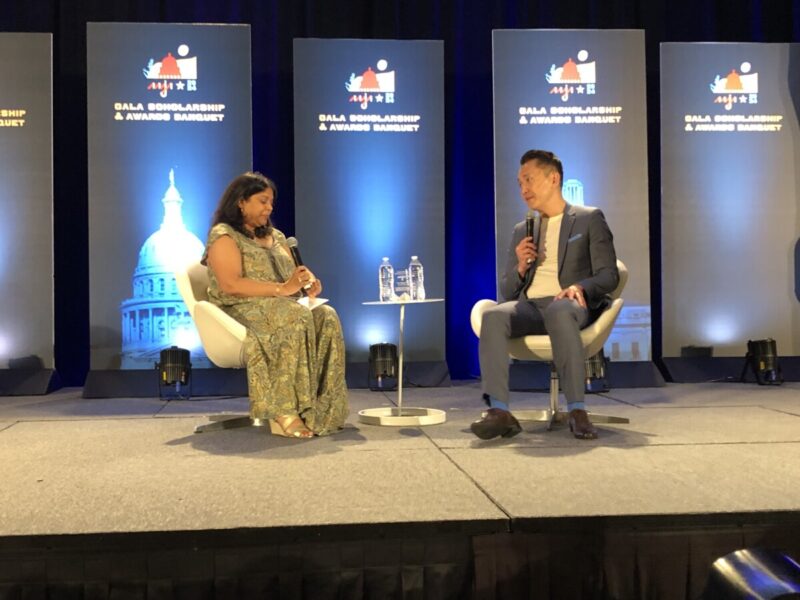
“To find your voice is to find your courage,” Viet Thanh Nguyen tells interviewer Niala Boodhoo of Axios. “That’s a test each of us has to face on your own.” (Credit: Richard Prince)
Viet Thanh Nguyen’s “The Sympathizer” won the 2016 Pulitzer Prize for Fiction and was adapted into an HBO series. The network described it as “an espionage thriller and cross-culture satire about the struggles of a half-French, half-Vietnamese communist spy during the final days of the Vietnam War and his new life as a refugee in Los Angeles, where he learns that his spying days aren’t over.”
Nguyen told the AAJA audience that the book was written in part to combat the “narrative scarcity” in popular culture of material that told the story of the Vietnam war from the viewpoint of those who did not have “narrative privilege. It was really crucial to be a defiant storyteller,” he said. “We always live in the margins of other people’s stories,” referring to Vietnamese.
The author and USC professor said he is not the first to face that challenge. There were Chinese American writers in 1899, he added, asking the audience to imagine what that must have been like.
Had he not written “The Sympathizer” and his later work, “I would have ceded the [narrative] to people who are not Vietnamese.”
To the applause of the audience of journalists, Nguyen added, “history shouldn’t be the only thing we’re allowed to do.”
Meanwhile, the association re-elected Washington Post investigative reporter Nicole Dungca as its president in a contest in which all candidates but one ran unopposed. Incumbent Marian C. Liu, Washington Post projects editor of special initiatives and partnerships, won the contest for vice president of civic engagement.
It also announced Seattle as its convention site for 2025. It will be the first time the association has convened in the city since the 1999 conference of the now-defunct Unity: Journalists of Color coalition.
- Pew Research Center: Asian Americans: Survey Data Snapshot
- Doris Truong, Poynter Institute (past AAJA president): ‘Full-circle’ moment: Asian American journalists get engaged while co-emceeing gala (Aug. 14)
Reporters Say V.P. Pick Walz Earned Blacks’ Trust
Aug. 9, 2024
An ‘Old White Guy’Sides With the Marginalized
What Was It Like to Cover Kamala Harris?
Merida to Chronicle LeBron for WaPo Opinions
Roy Wood Jr. to Host CNN Panel Show
AAJA Limits Media Coverage; Just 1 Signs Up
Axios Lays Off 50, ‘Painful but Necessary’
ABC’s Pierre Thomas Visits Home of Enslaved Ancestors
Short Takes: Louisiana curbs press access; census and Afro-Latinos; big grant to Student Press Law Center; Charles Barkley; Oliver Darcy; Robin Wilson-Glover; Kennan Oliphant; Ismaeel Naar; Venezuela journalists attacked; Larry Madowo; attacks on journalists in Kenya, Nigeria
Homepage photo: Minnesota Gov. Tim Walz signs into law a sweeping package of police accountability measures on July 23, 2020. They included a ban on neck restraints and chokeholds and fear-based or “warrior-style” training, which critics say promotes excessive force. (Credit: Glen Stubbe/Star Tribune, Minneapolis)
Support Journal-ismsAfter the conviction of Derek Chauvin and the shooting death of Daunte Wright, KARE-TV in Minneapolis reports on April 30, 2021, on Gov. Tim Walz’s push for statewide police reform. (Credit: YouTube)
An ‘Old White Guy’ Sides With the Marginalized
“Though Kamala Harris’ vice presidential running mate, Tim Walz, may be seen as an ‘old white guy’ – a phrase the Minnesota governor used in jest during his first campaign rally on Tuesday – those familiar with his record say he has always been on the side of Black and marginalized communities,” Gerren Keith Gaynor wrote Wednesday for The Grio.
Brandon Tensley, writing Tuesday in Capital B, another Black online publication, reported much the same. “Walz, who armed Democrats with powerful messaging when he described Republicans as ‘just weird,’ will likely have broad appeal, given his positions on key issues affecting Black communities,” Tensley wrote.
Other journalists interviewed Minnesota’s Black attorney general, Keith Ellison, who recalled that Walz personally asked him to be lead prosecutor in the case of the George Floyd murder. After Ellison won that case, Vice President Kamala Harris phoned him with a congratulatory message.
[“The brother of the man who was at the center of the crisis says he’s putting his full support behind Walz,” Olivia Rubin reported Friday for ABC News.
[” ‘What I took from him was a good man,’ George Floyd’s brother, Philonise Floyd, said in a phone interview with ABC News. ‘You don’t meet a lot of people like him.’ “]
“Tim Walz and I were elected to Congress together in 2006 and statewide office together in 2018,” Ellison said in a statement. “We have worked alongside one another for almost 20 years, so I can say with confidence that there is no better choice for Vice President of the United States of America. Tim has the courage of a veteran, the compassion of a school teacher, the grit of a football coach, and the experience of both a congressman and governor.”
Tensley continued, “Walz has been in the vanguard of protecting the sanctity of the ballot box. In May, he signed the Minnesota Voting Rights Act. The legislation revives private enforcement after an 8th U.S. Circuit Court of Appeals ruling last year limited who can sue under the Voting Rights Act of 1965, weakening a centerpiece of the Civil Rights Movement.
“Additionally, the legislation makes it easier for college students to vote and eliminates prison gerrymandering by using an incarcerated person’s previous address instead of the address of their place of imprisonment for census counting. . . .”
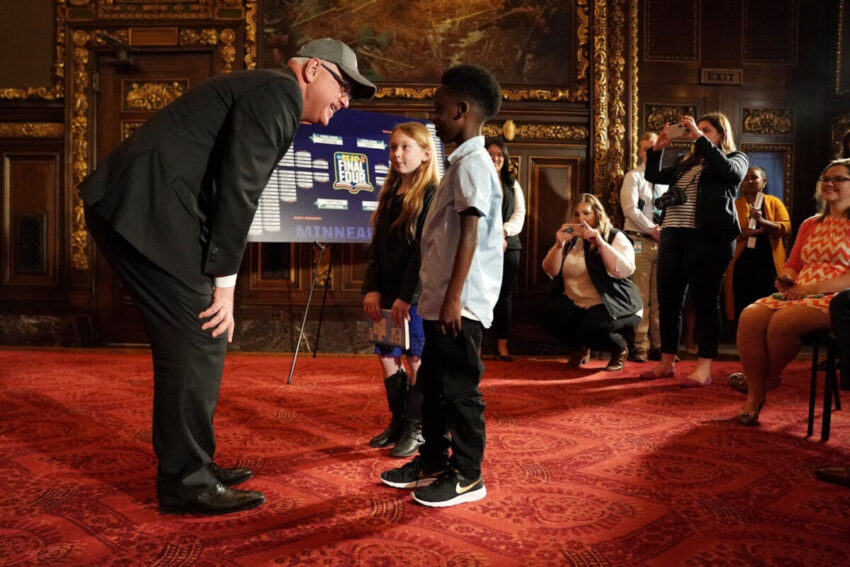
Minnesota Gov. Tim Walz, a former schoolteacher, spoke with third graders at an event encouraging children to read. His former students said he was inspiring in the classroom. (Credit: Star Tribune)
Moreover, Walz has advocated for a number of other causes that especially help Black communities, Tensley wrote. “In July, he signed the African American Family Preservation Act to grant greater protections to families confronted with separation in the foster care system. In . . . 2023, he signed the CROWN Act to combat the discrimination Black and brown people face in the workplace and at school because of their hair texture or style. And in 2021, he established the Missing and Murdered African American Women’s Task Force [PDF] to address the violence plaguing Black women.
“Propelled by the killing of George Floyd in 2020, Walz enacted police reforms after a lengthy struggle to get a bill through the state’s divided government. . . .”
Gaynor quoted Fred Redmond, secretary-treasurer at AFL-CIO and the highest-ranking Black American in labor movement history, who said Walz “has proven to be a friend of the Black community. . . Just by virtue of some of the legislation that he passed as governor, some of the bills that he supported while he was a member of Congress … I think our community will really get behind his candidacy.”
In the Spokesman-Recorder, the Black-owned Minnesota newspaper, Al Brown wrote Tuesday of Walz, “In 2020, he stood in solidarity with peaceful protestors, advocating for police reform while simultaneously addressing state concerns about public safety. This balanced approach resonated with voters following the tragedy that shook the nation, showcasing his ability to listen and respond to the will of the people.
“Moreover, the national discourse around police accountability and civil rights will undoubtedly remain at the forefront of the upcoming election. Walz’s experience navigating these issues gives Harris’s campaign a potent asset. His participation in various public forums discussing police reform demonstrated his commitment to finding solutions that embrace justice while respecting community needs, making him a compelling choice in a time hastened by demands for change. . . .”
Perhaps receiving even more media attention, in March 2023, Walz signed a bill to provide free school meals — both breakfast and lunch —for Minnesota students at participating schools, regardless of their family’s income.
- Zeeshan Aleem, MSNBC: The Tim Walz pick is a win for economic populism
- Jon Allsop, Columbia Journalism Review: The Tim Walz vibe shift
- Perry Bacon Jr., Washington Post: Tim Walz is a bold, smart choice for Harris’s running mate
- Josh Barro, Charles M. Blow, Jane Coaston, Gail Collins, Michelle Cottle, Liam Donovan, Ross Douthat, Michelle Goldberg, New York Times: He Stands Out in a ‘Sea of Elites and Strivers’: Our Writers on What Tim Walz Brings to the Ticket
- Kalle Benallie, ICT News: Kamala Harris selects Minnesota’s Tim Walz as running mate
- Charles M. Blow, New York Times: Harris, Walz and Democrats’ Joyful Campaign
- Shane Goldmacher, Katie Rogers, Reid J. Epstein and Katie Glueck, New York Times: How Kamala Harris Trusted Her Gut and Picked Tim Walz
- LZ Granderson, Los Angeles Times: By picking Tim Walz as running mate, Harris shows how she aims to win
- Emil Guillermo, Asian American Legal Defense and Education Fund: After the GOP insult at NABJ, Kamala Harris plays her race card–Gov. Tim Walz, the anti-Trump
- Shannon Heffernan and Beth Schwartzapfel, Marshall Project: Tim Walz on Criminal Justice: 5 Things to Know
- Erick Johnson, Chicago Crusader: Harris’ VP running mate a defender of Black causes as Minnesota governor
- Zachary Leeman, Mediaite: Joy Reid Says Mark Kelly Would Have Been a Safer Pick for Kamala Harris VP Because He’s ‘Mayonnaise Sandwich’ White
- Megan Messerly, Politico: How a summer of unrest sparked by George Floyd’s murder put Walz in the spotlight
- Kadin Mills, ICT News: Could we have the first Native American woman governor? With Tim Walz as Kamala Harris’ vice president pick, Peggy Flanagan could make history — again #NativeVote24
- National Criminal Justice Association: Tim Walz’ Record On Criminal Justice
- Santul Nerkar, New York Times: ‘Fun Midwestern Dad’ or ‘Radical’? How Media Outlets on the Left and Right Are Covering Tim Walz.
- Laura Yuen, Star Tribune: What was ‘Mr. Walz’ like as a teacher? Former students say he’s same guy vying to be the next VP
A new PBS News/NPR/Marist poll shows Kamala Harris with a three-point lead over Donald Trump nationally, within the poll’s margin of error, Amna Nawaz and Geoff Bennett reported Tuesday for the “PBS News Hour.” “We have seen a 20-point jump among Black voters, 25-point jump among white college-educated women, and 28-point jump among independent women,” said Domenico Montanaro, senior political editor and correspondent for NPR. (Credit: PBS News Hour/YouTube)
What Was It Like to Cover Kamala Harris?
“Kamala Harris’s name first appeared in the San Francisco Chronicle in 1994 and, since then, outlets across the state have tracked her political ascent,” Kevin Lind reported Tuesday for Columbia Journalism Review. “The California journalists who have followed her from her days as the district attorney of San Francisco know her as few in the press do.
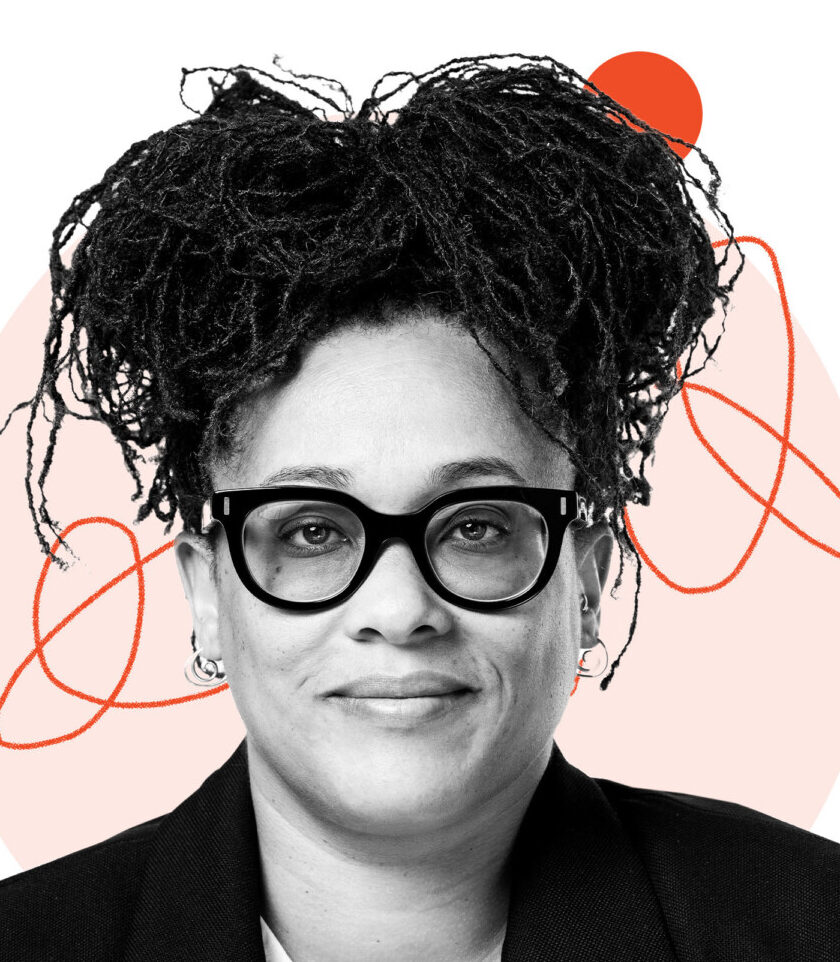 “Erika D. Smith (pictured) — formerly at the Sacramento Bee, now a columnist at Bloomberg — could sense, early on, the scale of Harris’s ambition: ‘It always just seemed like she was destined to do something else,’ she said. ‘The question was just what?’ “
“Erika D. Smith (pictured) — formerly at the Sacramento Bee, now a columnist at Bloomberg — could sense, early on, the scale of Harris’s ambition: ‘It always just seemed like she was destined to do something else,’ she said. ‘The question was just what?’ “
 Vic Lee (pictured), a longtime broadcast journalist with KRON and KGO-TV in the San Francisco Bay Area, observed, after visiting Harris at home: “Boy, Kamala takes a lot after her mom.”
Vic Lee (pictured), a longtime broadcast journalist with KRON and KGO-TV in the San Francisco Bay Area, observed, after visiting Harris at home: “Boy, Kamala takes a lot after her mom.”
“Recently,” Lind wrote, “I spoke with these and other journalists who have wisdom to share about covering Harris from their experience in local newsrooms. . . .”
Lee told Lind, “She was always reachable, available, and very gracious with her time. Never dodged me. I think she was that way with most reporters. She took a lot after her mother. Her mother was gracious and very kind. I thought Harris was a good district attorney. She had some problems — she was district attorney when the crime lab scandal happened. That’s the only negative I remember during her tenure. . . . “
Smith said, in part, “The reality is the more she trusts people, the more she’s willing to open up. I’m not saying that I’ve interviewed her enough to break that down, but I do know of reporters who have, where she’ll share recipes or other things. I don’t think that she’s not willing to talk about herself. She’s not going to talk about herself to everybody.
“I think that most Americans have never had a Black woman boss. They may not even know that many Black women beyond characters they see on TV. They may not even know anybody who’s from California, either. In some ways, she’s defining this territory. People are glomming expectations onto her, rightly or wrongly, based on their own experience. That’s something that complicates this whole conversation. But the thing about it is, when I talk to her, when I have interacted with her, she’s exceedingly normal.”
Also interviewed: Joe Eskenazi, managing editor of Mission Local, former columnist for SF Weekly; Carla Marinucci, political journalist, formerly with Politico and the San Francisco Chronicle; Kevin Fagan, reporter, San Francisco Chronicle; and Dan Morain, author of “Kamala’s Way,” a former Los Angeles Times columnist and editorial page editor at the Sacramento Bee.
Separately, former president Donald Trump Thursday re-committed to a debate with Harris on ABC on Sept. 10, after backing out last week.
- Char Adams and Sakshi Venkatraman, NBC News: Mixed-race voters say Donald Trump’s attacks on Kamala Harris’ race are painfully familiar
- Perry Bacon Jr., Washington Post: Harris’s electoral path will probably be more like Biden’s than Obama’s
- Thomas Beaumont, Associated Press: Vance and other Trump allies amplify a false claim about Harris’ racial identity
- Jamelle Bouie, New York Times: Trump Pulls Out His Birther Bag of Tricks
- Curtis Bunn, NBC News: Harris’ political ascent makes her the latest target of DEI insults
- Linda Earley Chastang, NABJ Black News & Views: FIRST PERSON: ‘Mississippi Freedom Summer’ is back through Kamala Harris campaign
- Nate Fox, Arab America: Kamala Harris: The Shifting Disposition of Arab Americans
- Renée Graham, Boston Globe: In this presidential contest, we still aren’t having the right conversations about aging
- Duchess Harris, The Conversation: Kamala Harris and Black joy: Why the vice president’s laughter matters
- Adam Mahoney, Capital B: Project 2025 Wants to Kill a Solution to Alabama’s Sewage Problem
- Priya E. Mammen, Philadelphia Inquirer: During this unforgettable summer in politics, Indian American women have arrived
- Ruben Navarrette Jr., syndicated: DEI attacks on Kamala Harris are racist and unfair (video)
- Ruben Navarrette Jr., syndicated: What is Trump’s biggest problem? Trump, of course.
- Kimberley Richards, HuffPost: JD Vance Faces Swift Backlash After Accusing Kamala Harris Of Faking ‘Who She Is’
- Kimberly Atkins Stohr, Boston Globe: How Project 2025 backfired on the GOP and Trump
- Brandon Tensley, Capital B: Harris, Like Obama, Must Defend Her Identity Along With Her Policy Positions
- Sakshi Venkatraman, NBC News: Lotus for POTUS’ energizes South Asian voters around Harris (July 31)
- Alex Woodward, the Independent: Trump tells Adin Ross he wants to ‘fire’ Black journalist who grilled him onstage
Kevin Merida posted on LinkedIn in May, “Haven’t done much of this since I left the LA Times, but enjoyed chopping it up with my friend and former ESPN/The Undefeated (now Andscape) colleague Mark W. Wright, who hosts the hashtag#PressPausePodcast. We had fun talking about everything from newspapers and the future of journalism to the NBA and how it can improve its All-Star Weekend. Here’s a link if you want to take a listen on your next walk or hike.”
Merida to Chronicle LeBron for WaPo Opinions
Kevin Merida is a sports fan who was senior vice president at ESPN and editor-in-chief of The Undefeated (now Andscape), and remained so during his nearly 23 years at The Washington Post and almost three more as executive editor of the Los Angeles Times. Now he is returning to the Post for a project that builds on those experiences.
“I am going to take on a yearlong project for The Post Opinions section as a contributor,” Merida messaged Journal-isms Tuesday.
“Not as a Post staffer. So keeping my independence out in the marketplace. But happy to be writing again. And will do other things as well. This project is part of a David Shipley/Post Opinions initiative — they’ve asked some writers to take in an idea for a year.
“Anne Lamott, for instance, took in aging. I’m gonna take on LeBron, greatness, transition. And try to write for a general audience — more assessment, perspective and contemplation (rather than reporting and daily chronicling) of one of the most successful human beings on the planet. Completely dominant in his field for 20 years. But more on that later. The form will be columns/essays, but also other storytelling devices.”
The references are to Post Opinions editor David Shipley and of course to LeBron James, who as a star on the U.S. Olympic men’s basketball team fought back from a 13-point deficit Thursday to beat Serbia in a thrilling men’s basketball semi-final (video).
- Roy S. Johnson, al.com: Olympics allow us to escape, dream, and root for a better world
- Keith Magee, CNN: Why you should pay attention to the role of race in sport during this summer’s Olympics
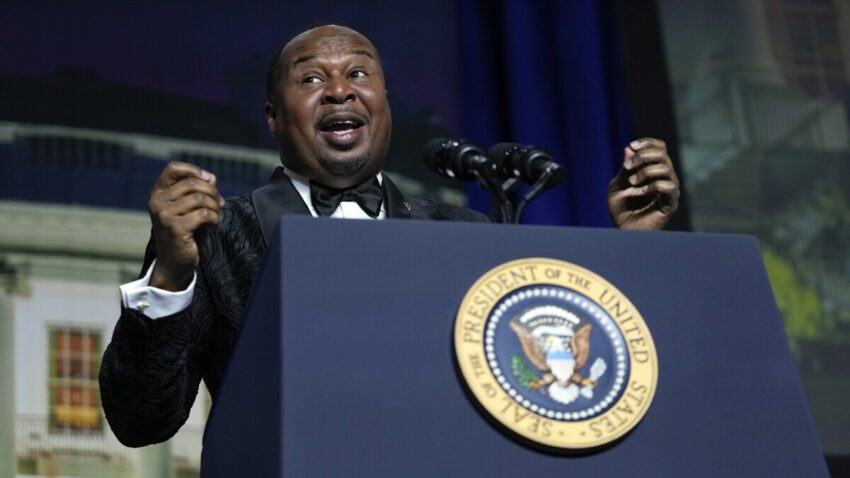
Roy Wood Jr. hosted the White House Correspondents’ Dinner (video) in 2023. (Credit: NBC News screenshot)
Roy Wood Jr. to Host CNN Panel Show
“Roy Wood Jr. is getting back into the news-and-comedy game,” Rick Porter reported Thursday for the Hollywood Reporter.
“The comedian and Daily Show alum has been named the host of Have I Got News for You at CNN. The cable news outlet will debut its version of the long-running BBC panel show on Sept. 14.
“Have I Got News for You is a BBC staple, having been on the air since 1990. The show features two teams of panelists answering questions about the week’s news, with a heavy dose of humor. CNN announced in May that it was developing its own version of the show with Hat Trick Productions, producer of the BBC show.
“ ‘For far too long immigrants have been coming to America and taking Black jobs, kudos to CNN and the immigrants at Hat Trick Productions for bringing a Black job to the States,” Wood said in a statement. ‘It is an honor to be a part of such a hallowed British institution to help make sense of the American institutions of chaos, name calling, disinformation, reality television and the 8-hour news cycle.’ ”
- Journal-isms: Roy Wood Jr. Exits ‘The Daily Show’ (Oct. 6, 2023)
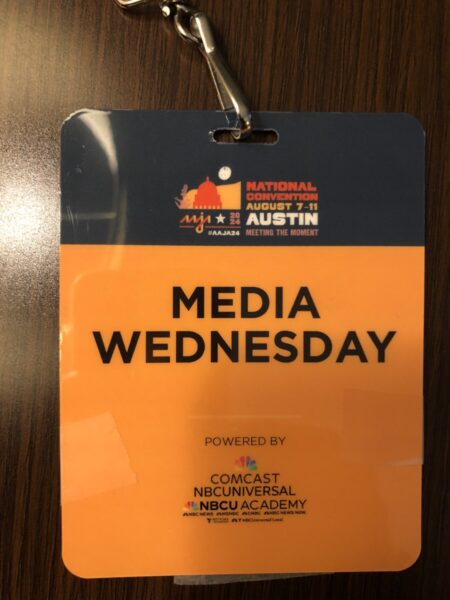
AAJA says, “We want the convention to be as accessible as possible to as many members as possible; as you may know, AAJA conventions have sold out the past two years. This is why we limit press passes to one day.” (Credit: Richard Prince)
AAJA Limits Media Coverage; Just 1 Signs Up
A new policy requires journalists covering the Asian American Journalists Association convention to spend up to $675 to register for the conference if they want to report on it for more than one day.
The response: Only one journalist — this columnist — applied for press credentials, and did not accept the offer to register.
The National Association of Hispanic Journalists adopted the same policy last month at its conference in Hollywood, Calif. It did slightly better. Two people applied for press credentials — this columnist and a representative of a local station that had an anchor on one of its panels, according to Andrew Sherry, who manages public relations for both associations.
The response was reflected in the coverage, or lack of it. Though both organizations seemingly want to publicize their work and get their advocacy messages out, search engines show only one story in the mainstream media about the NAHJ conference. That was in De Los, the Spanish-interest section of the Los Angeles Times.
There has been no coverage so far of the AAJA conference, which began Wednesday in Austin, Texas, save for reporting of a news release.
By contrast, the National Association of Black Journalists, which has no such one-day-only requirement, issued press credentials to at least 70 journalists, and that was before the news of Donald Trump’s then-impending appearance was announced. The onslaught of coverage is now one for the record books.
Some journalists, told of the AAJA and NAHJ policies responded with “Wow, that’s crazy,” “they’re being penny wise and pound foolish,” or “seems contradictory for a media organization to restrict media access.”
“If you can feel their pain, you can tell their story.” – @abc7davidono @ABC #AAJA24 #storytelling pic.twitter.com/Lr1MdvChcw
— Jannelle “Jae” Andes (@janne11e) August 8, 2024
As Sherry explained the policy, there is no difference between a reporter whose beat has been media diversity for decades and a weather reporter in Anytown, USA.
“The reason for the policy is that virtually all convention attendees are working journalists engaging with the sessions in a professional capacity, and their registration fees directly support the convention,” he said. “A one-day pass allows coverage of a specific session by a journalist who might not be interested in the whole conference.”
Ai Uchida, AAJA deputy director and director of operations, put it this way in an email: “AAJA has a one-day media policy for approved press at our convention. That is how we have been doing it since post-COVID. We do it this way because we want the convention to be as accessible as possible to as many members as possible; as you may know, AAJA conventions have sold out the past two years. This is why we limit press passes to one day.”
NABJ has a different take on the “everybody is a journalist” view: Its application form says, “Media representatives will be required to submit documentation from their supervisor of approval to cover the convention, and possibly a copy of their work ID upon completion of the credentials form.”
As of Friday, AAJA had 1,489 registrants, according to Sherry. NAHJ said Friday it hosted 1,840 journalists, media executives and exhibitors; NABJ 4,364 and the Indigenous Journalists Association 402 this year.
For this conference, AAJA announced a revision of its style guide and headlined another release, “First-of-its-kind analysis shows Asian American broadcasters face significant gaps, especially on gender.“
The style guide is “not meant to be a dictionary or encyclopedia on all things Asian but an actionable and practical guide by AAPI journalists to add context and guidance to terms that are being used or that should be avoided in the news,” according to the announcement.
“For example, it reminds journalists that ‘illegal’ can be used to describe an action, but applying it to an immigrant is inaccurate and dehumanizes the person described. The term ‘kamikaze drone’ is an inaccurate and insensitive way to describe an exploding unmanned aircraft. And the 120,000 Japanese Americans and Japanese nationals detained in the U.S. during WWII were ‘incarcerated,’ not ‘interned.’ ”
On the broadcasters, the release says, ” ‘Both female and male AANHPI [Asian American, Native Hawaiian, and Pacific Islander] broadcast journalists face career challenges, but often in different ways that aren’t widely understood, which is particularly challenging given stereotypes and biases towards AANHPIs.’ says Naomi Tacuyan Underwood, AAJA Executive Director. ‘For instance, data shows that despite improvements in recent years, AANHPI men are far from reaching full representation, while AANHPI women are seldom given full-time roles. ‘ “
As with all of the journalists-of-color conventions, attendees said they were most looking forward to seeing old friends and colleagues. Job seekers visited the career fair. Panel discussions included such topics as “Asian Americans in Texas,” “Elevating Diverse Stories: Why It’s Important and How to Get Them on the Air,” “From Crisis to Coverage: How to Be Safe and Report,” “Get Camera Ready in 15 Minutes,” “Reporting on Asian American Muslims,” “Championing Press Freedom: Our Commitment in the US and Globally,” artificial intelligence and skills training.
A “mini film fest” featured “A Great Divide,” written by journalist Jeff Yang.
The closing Gala Scholarship & Awards Banquet Saturday is to feature pioneering broadcaster Connie Chung and Viet Thanh Nguyen, noted Vietnamese American novelist and a professor.
No membership meeting is scheduled; “The Board wants to make it more inclusive by hosting it online, so people who aren’t at the conference can participate. We’ll announce the (early fall) date soon,” Sherry said.
- Robin Blinder, E&P Magazine: No winner here: Trump at the NABJ
- Shamira Ibrahim, Prism: NABJ failed Black journalists
- Keyaira Kelly, Refinery 29: After Trump At NABJ, Black Journalists Are Divided. Where Do We Go From Here?
- Mark Levin, Fox News: Trump was ‘set up’ at National Association of Black Journalists conference (video)
- Herbert Lowe, Poynter Institute: Former NABJ president: Backlash against Trump Q&A is ‘astounding and disappointing’
- Pew Research Center: Asian Americans: A Survey Data Snapshot
- Natalie Wambui and Nikeya Tankard, MV Times: Tonight: NABJ hosts Island discussion after Trump comments
- Alex Woodward, the Independent: Trump tells Adin Ross he wants to ‘fire’ Black journalist who grilled him onstage
Axios Lays Off 50, ‘Painful but Necessary’
At least four journalists of color are leaving Axios as the media outlet eliminates 50 positions to “get ahead of tectonic shifts in the media, technology, and reader needs/habits,” in the words of CEO Jim VandeHei.
“This is a painful but necessary move to tighten our strategic focus and shift investment to our core growth areas,” VandeHei wrote, Natalie Korach reported Tuesday for The Wrap. “We’re making some difficult changes to adapt fast to a rapidly changing media landscape.”
Simran Parwani, a data visualization journalist wrote on X, “Guess it’s my last week
@axios
, still a bit shocked and sad that half our team was laid off, but grateful to have learned so much from my kind, brilliant
@AxiosVisuals. coworkers”
Wilborn P. Nobles III of Axios Atlanta wrote, “Trying to handle my new situation with levity, but yeah. Taking an internet break, but let’s stay in touch fam. God bless.”


Sam Robinson tweeted, “I’m losing my job Friday! Oh well. If you’re a staffer I’ve been working with: Please send all campaign stuff/press releases” to [his personal email address]. When Robinson posted some political news, laid-off colleague Selene San Felice, who worked for Axios in Tampa Bay, wrote, “You can take the reporter out of the job, but you can’t take the job out of the reporter. Or something.” Robinson replied, “The f— else am I gonna do?
(Credit: YouTube)
ABC’s Thomas Visits Home of Enslaved Ancestors
“Genealogists and researchers spearhead the ’10 Million Names’ project, an ambitious initiative to identify every enslaved Black American by name,” Doc Louallen and Terri Martin wrote Wednesday for ABC News. “It led ABC News Senior Justice Correspondent Pierre Thomas to discover the West Virginia plantation where his ancestors were born into slavery.
“ABC News is the exclusive media partner of the historic ’10 Million Names’ project, a moonshot endeavor that aims to use ancestry research to put a name to each enslaved person to not only acknowledge their dignity, but to connect their living descendants with their family history. . . .”
“It’s hard for me to be here, it’s a challenge,” Thomas says as he visits the Jenkins Plantation, the ancestral home of his great-great-grandmother. While there are statues of Albert Gallatin Jenkins, the slaveholder, Harvard graduate, two-term congressman and Confederate general,” Thomas wonders what his own ancestors looked like.
Vincent Brown, Harvard University professor and “10 Million Names” scholar, reminds Thomas, “We have more pictures of enslavers than we have of the enslaved people.”
Short Takes
- “On Thursday, a Louisiana law will go into effect that will make it a misdemeanor for anyone, including journalists, to be within 25 feet of a law enforcement officer if the officer orders them back,” Richard A. Webster reported July 31 for New Orleans’ Verite News. The outlet is a “Black-led nonprofit news organization with a twofold mission to produce in-depth journalism that serves the whole community while training, developing and mentoring a new generation of minority journalists.” Reporter Rich Webster talks about the law in this video.
- An analysis by the UCLA Latino Policy and Politics Institute “showed that the methods used by the U.S. Census and Office of Management and Budget to collect racial and ethnic data [do] not reflect the lived experiences of Latinos, especially Afro-Latinos,” Fernanda Figueroa reported Thursday for the Associated Press. “The report also provides some suggestions on how to generally improve collection of racial and ethnic data. ‘The current methods of data collection used by the OMB fail to accurately reflect the realities of racial discrimination faced by Latinos,’ said Cecilia Nuñez, co-author of the report titled ‘Latino is Not a Race: Understanding Lived Experiences through Street Race.’ ”
- “As it celebrates its 50th anniversary, the Student Press Law Center will expand its pro bono legal support for thousands of student journalists who are increasingly filling the gaps in local news for millions of Americans,” the center announced Sunday. “Thanks to a three-year, $1,225,175 grant from the John S. and James L. Knight Foundation, SPLC’s legal services for college journalists across the country — including its free Legal Hotline, pre-publication vetting, legal training and other resources — will give a growing number of student reporters the knowledge and confidence to pursue important stories. . . .”
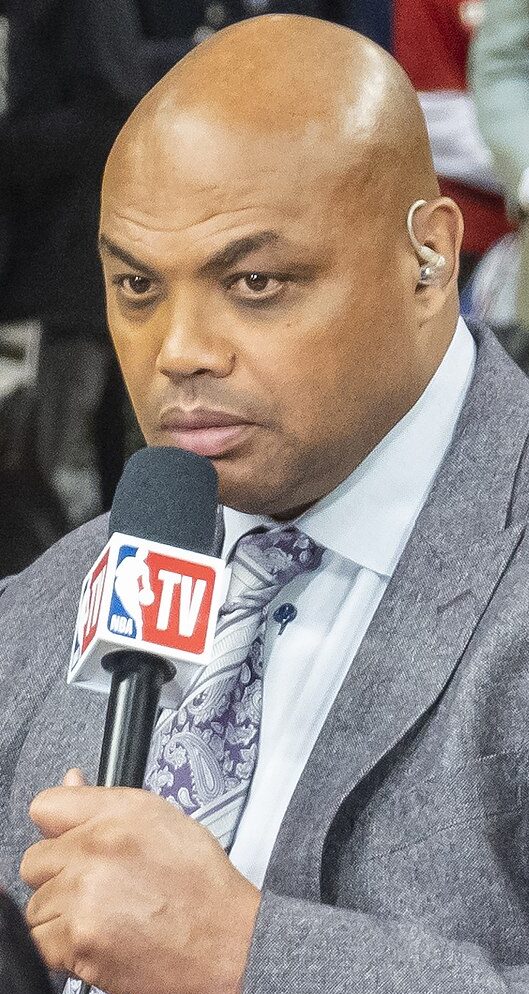 “Charles Barkley (pictured) says he isn’t getting out of Warner Bros. Discovery’s sports game,” Brian Steinberg reported Tuesday for Variety. “The roundball great, who is a mainstay of the long-running TNT studio show ‘Inside the NBA,’ said Tuesday that he will put off previously articulated plans to retire and continue to work through what is believed to be a ten-year contract that kicked off in 2022. Warner Bros. Discovery is in the midst of a heated legal squabble with the NBA over keeping some passel of rights to show games after the league’s next season. Barkley’s reversal could be seen as a sweetener. . . . “
“Charles Barkley (pictured) says he isn’t getting out of Warner Bros. Discovery’s sports game,” Brian Steinberg reported Tuesday for Variety. “The roundball great, who is a mainstay of the long-running TNT studio show ‘Inside the NBA,’ said Tuesday that he will put off previously articulated plans to retire and continue to work through what is believed to be a ten-year contract that kicked off in 2022. Warner Bros. Discovery is in the midst of a heated legal squabble with the NBA over keeping some passel of rights to show games after the league’s next season. Barkley’s reversal could be seen as a sweetener. . . . “
- “Oliver Darcy, the author of CNN‘s influential ‘Reliable Sources’ newsletter, has left the Warner Bros. Discovery-backed outlet, leaving the direction of the company’s media-industry franchise in doubt,” Brian Steinberg reported Thursday for Variety. “A new newsletter from Darcy, called ‘Status,” landed in email inboxes Thursday morning.”
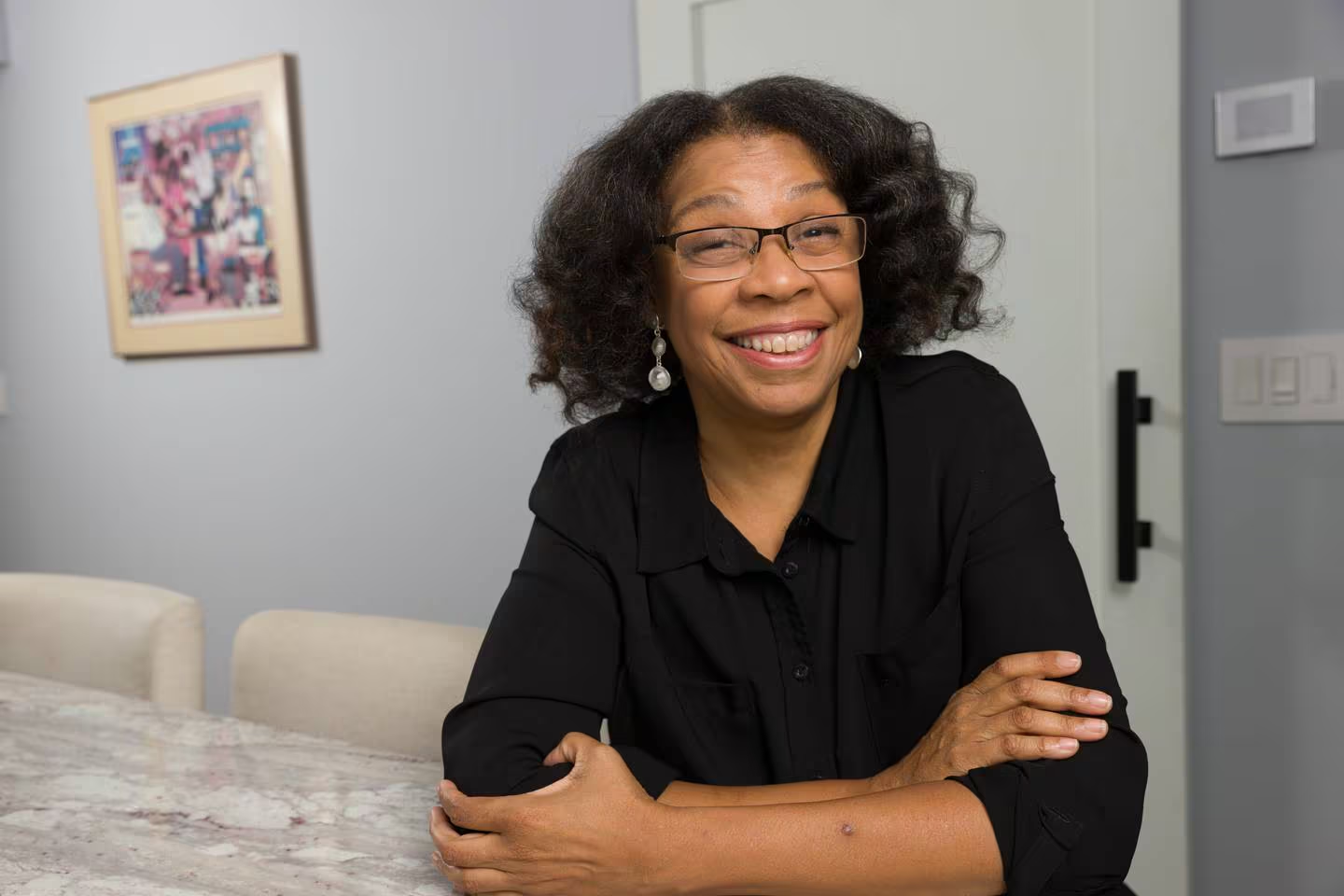 “After a journalism career of more than 40 years, Robin Wilson-Glover (pictured) has decided to retire from NJ.com and Mosaic, effective Aug. 2,” Ronnie Agnew, general manager of NJ Advance Media, wrote July 23. “For the past 26 years, Wilson-Glover has held editing roles for The Star-Ledger and New Jersey Advance Media. “While she is retiring from daily journalism, Wilson-Glover, a graduate of Syracuse University’s Newhouse School of Journalism, plans to continue teaching and mentoring future journalists at Rutgers University Newark. . . .”
“After a journalism career of more than 40 years, Robin Wilson-Glover (pictured) has decided to retire from NJ.com and Mosaic, effective Aug. 2,” Ronnie Agnew, general manager of NJ Advance Media, wrote July 23. “For the past 26 years, Wilson-Glover has held editing roles for The Star-Ledger and New Jersey Advance Media. “While she is retiring from daily journalism, Wilson-Glover, a graduate of Syracuse University’s Newhouse School of Journalism, plans to continue teaching and mentoring future journalists at Rutgers University Newark. . . .”
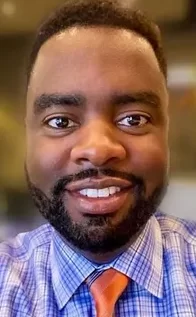 “Kennan Oliphant (pictured) has been named VP of news and station manager at WWJ Detroit,” Michael Malone reported July 24 for Broadcasting & Cable. “He will report to Jennifer Lyons, who has added a regional GM role that gives her oversight of the station, part of CBS News and Stations. In a memo to staff, Lyons said Oliphant will be the primary station manager when she is in Chicago, where she runs WBBM. Oliphant had been senior director of news at WXYZ-WMYD Detroit. Before that, he was senior manager of broadcast for WCPO Cincinnati.”
“Kennan Oliphant (pictured) has been named VP of news and station manager at WWJ Detroit,” Michael Malone reported July 24 for Broadcasting & Cable. “He will report to Jennifer Lyons, who has added a regional GM role that gives her oversight of the station, part of CBS News and Stations. In a memo to staff, Lyons said Oliphant will be the primary station manager when she is in Chicago, where she runs WBBM. Oliphant had been senior director of news at WXYZ-WMYD Detroit. Before that, he was senior manager of broadcast for WCPO Cincinnati.”
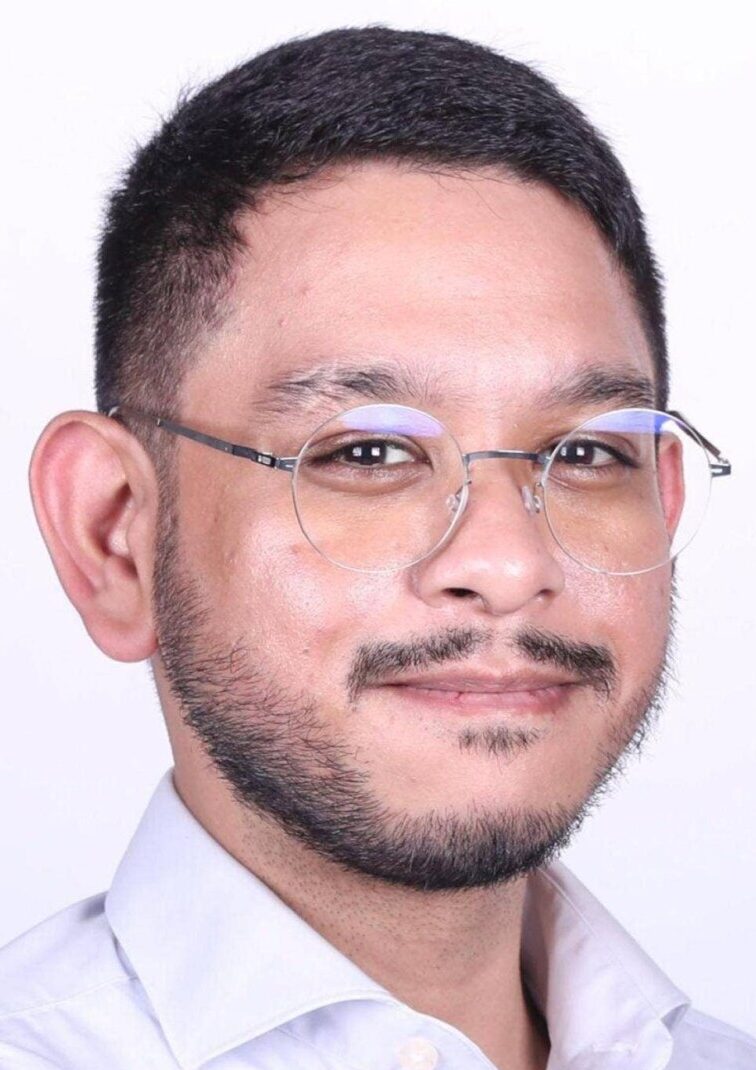 “We are excited to announce that a new reporter, Ismaeel Naar (pictured), is joining the Gulf bureau, helping us expand our coverage of a region that has grown exponentially in wealth and power over the past two decades,” New York Times editors told staffers Thursday. “Ismaeel, a Bahraini journalist who has reported from a dozen countries across the Middle East, will be based in Dubai, giving us a crucial foothold in the United Arab Emirates. Ismaeel was most recently the Arab affairs editor at The National, an Emirati newspaper that has served as a launch point for foreign correspondents around the Middle East. . . .”
“We are excited to announce that a new reporter, Ismaeel Naar (pictured), is joining the Gulf bureau, helping us expand our coverage of a region that has grown exponentially in wealth and power over the past two decades,” New York Times editors told staffers Thursday. “Ismaeel, a Bahraini journalist who has reported from a dozen countries across the Middle East, will be based in Dubai, giving us a crucial foothold in the United Arab Emirates. Ismaeel was most recently the Arab affairs editor at The National, an Emirati newspaper that has served as a launch point for foreign correspondents around the Middle East. . . .”
- In Venezuela, at least 40 journalists reporting in regions outside of the capital of Caracas have been attacked as of July 31, “caught in a wave of protests and repression that swept the country after electoral authorities called a disputed election for President Nicolás Maduro. This is according to numbers from the Press and Society Institute of Venezuela (IPYS, for its acronym in Spanish),” César López Linares and Katherine Pennacchio reported Aug. 6 for LatAm Journalism Review. “The attacks – including baseless accusations of terrorism and ‘incitement to hatred’ – have contributed to a climate of fear among journalists in the regions, where most work independently or for small media outlets. . . .”
- The Committee to Protect Journalists said it “urges the New York Police Department to explain its reasons” for arresting independent New York videographer Samuel Seligson on hate crime charges “after he reported on pro-Palestinian protesters who smeared red paint on the homes of two Brooklyn Museum officials, including the director who is Jewish,” CPJ said Wednesday.
- CNN’s Larry Madowo was on location in Nairobi, Kenya, on Thursday “to cover the protests over President William Ruto’s new cabinet when he was struck in the face by a projectile while on camera,” Jamie Frevele reported for Mediaite. “CNN anchor Jim Acosta talked to Madowo after the incident, reassuring the audience first that he was ‘okay’ before playing the footage. Madowo was seen reporting on the scene of riot police firing on ‘largely peaceful protestors.’ As he navigated the crossfire, he grabbed his face and yelled out: ‘That was aimed directly at me. He’s aiming directly at me. He’s aiming directly at me… AGH! He’s shooting directly at me. Why are you shooting at me? Why are you shooting at me? Why are you shooting at me? There’s a flash bang there, watch out. He is still shooting.’ . . .”
- The Federation of African Journalists said July 21 it “condemns in the strongest terms the recent violent attacks on journalists in Kenya, viewing them as severe assaults on press freedom and the safety of journalists in the country. These reprehensible actions not only threaten the individuals targeted but also undermine the fundamental principles of democracy and the free flow of information. . . .”
- The Committee to Protect Journalists Tuesday called on Nigerian authorities “to investigate reports that dozens of journalists were assaulted, harassed, and detained while covering cost-of-living protests, which began on August 1. CPJ is investigating multiple incidents including one in the capital Abuja on August 3, where masked security forces fired bullets and teargas at several journalists wearing ‘Press’ vests and their media-branded cars at the national stadium. . . .”
To subscribe at no cost, please send an email to journal-isms+subscribe@groups.io and say who you are.
Facebook users: “Like” “Richard Prince’s Journal-isms” on Facebook.
Follow Richard Prince on Twitter @princeeditor
Richard Prince’s Journal-isms originates from Washington. It began in print before most of us knew what the internet was, and it would like to be referred to as a “column.” Any views expressed in the column are those of the person or organization quoted and not those of any other entity. Send tips, comments and concerns to Richard Prince at journal-isms+owner@
View previous columns (after Feb. 13, 2016).
View previous columns (before Feb. 13, 2016)
- Diversity’s Greatest Hits, 2018 (Jan. 4, 2019)
- Book Notes: Is Taking a Knee Really All That? (Dec. 20, 2018)
-
-
- Book Notes: Challenging ’45’ and Proudly Telling the Story (Dec. 18, 2018)
-
-
-
- Book Notes: Get Down With the Legends! (Dec. 11, 2018)
-
-
-
- Journalist Richard Prince w/Joe Madison (Sirius XM, April 18, 2018) (podcast)
-
-
-
- Richard Prince (journalist) (Wikipedia entry)
-
-
-
- February 2018 Podcast: Richard “Dick” Prince on the need for newsroom diversity (Gabriel Greschler, Student Press Law Center, Feb. 26, 2018)
-
-
-
- An advocate for diversity in the media is still pressing for representation, (Courtland Milloy, Washington Post, Nov. 28, 2017)
-
-
-
- Morgan Global Journalism Review: Journal-isms Journeys On (Aug. 31, 2017)
-
-
-
- Journal-isms’ Richard Prince Wants Your Ideas (FishbowlDC, Feb. 26, 2016)
-
-
-
- Richard Prince with Charlayne Hunter-Gault, “PBS NewsHour,” “What stagnant diversity means for America’s newsrooms” (Dec. 15, 2015)
-
-
-
- Book Notes: Journalists Follow Their Passions
-
-
-
- Book Notes: Journalists Who Rocked Their World
-
-
-
- Book Notes: Hands Up! Read This!
-
-
-
- Book Notes: New Cosby Bio Looks Like a Best-Seller
-
-
-
- Journo-diversity advocate turns attention to Ezra Klein project (Erik Wemple, Washington Post, March 5, 2014)
-

